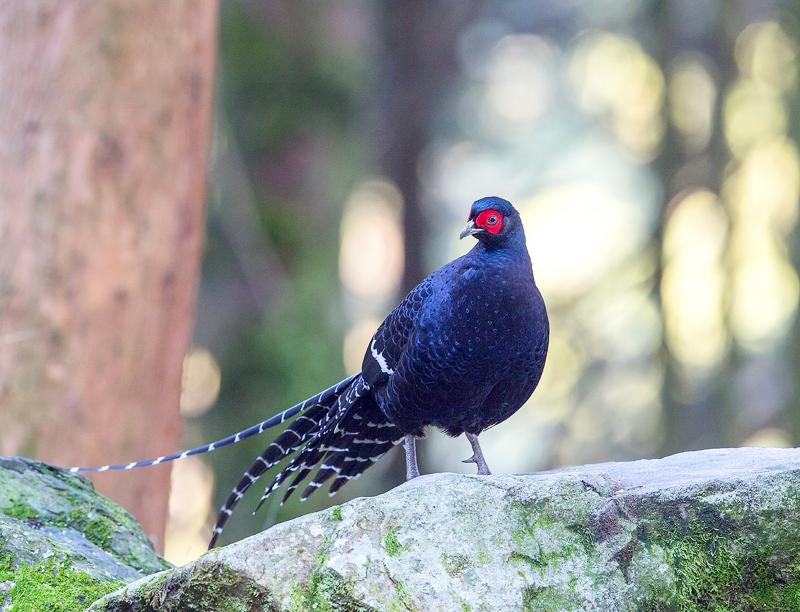The mikado pheasant, also known as “emperor’s pheasant,” is a species of pheasant endemic to Taiwan that is featured on Taiwan’s NT$1,000 bill. The mikado pheasant was once on the verge of extinction. However, thanks to the hard efforts of conservation workers, it has now returned to stable population levels. The Ministry of the Interior on Thursday shared the good news on its official Facebook page. It is a hard-won achievement that has been 30 years in the making. The ministry used the post to remind the public that if they encounter mikado pheasants while in mountainous or forest areas, they should admire the birds from a distance and refrain from disturbing them. The ministry also said that it hopes everyone will work together to protect Taiwan’s ecological diversity.
Taiwan is the only country in the world to have achieved success with a mikado pheasant breeding program. Since it was discovered that the mikado pheasant faced extinction, during 30 years of observation, the bird’s population within Yushan National Park has increased from just over 5,000 in 1986 to more than 10,000 today.
According to the Yushan National Park Administration Office, the mikado pheasant’s name was coined in 1906 when British ornithologists traveled to Yushan to collect specimens and inadvertently discovered two tail feathers of a male mikado pheasant on the headdress of a Tsou Aborigine. After being sent back to Britain for identification, the bird was announced as a new species.

Photo courtesy of Hsieh Yu-chen 照片:謝郁震提供
The mikado pheasant often inhabits high mountains at an altitude of 1,800 to 3,300m above sea level and it likes dense fog. In addition to Yushan National Park, the mikado pheasant can also be seen at Shei-Pa National Park and Taroko National Park.
(Translated by Edward Jones)
被印在千元鈔上的台灣特有種鳥類「帝雉」原已瀕臨絕種,不過在相關單位復育人員努力下,如今已復育有成。內政部週四特別在臉書粉專分享相關訊息,表示這是經過三十年的努力,提醒民眾若在山林巧遇牠們,可以遠遠欣賞,不要刻意驚擾,也期盼大家未來共同努力守護生態多樣的台灣。

Photo courtesy of China Airlines via CNA 照片:華航提供/中央社
全世界只有台灣有的帝雉復育有成。經過三十年觀察,發現瀕臨絕種的帝雉,已經從一九八六年玉山國家公園觀測到的五千多隻,提升到目前的超過一萬隻。
根據玉山國家公園管理處,帝雉命名起源於西元一九○六年,由英國人深入玉山進行蒐集標本工作時,無意間在鄒族人的頭飾上發現了兩根雄帝雉的尾羽,經送回英國鑑定後,發表為新品種。
帝雉常棲息於海拔一千八百到三千三百公尺高山上,喜歡濃霧,不只在玉山國家公園、雪霸國家公園,還有太魯閣國家公園都可以看到牠的蹤跡。
(自由時報)

Even as he grows older, Microsoft founder Bill Gates still fondly remembers the catalytic computer code he wrote 50 years ago that opened up a new frontier in technology. Although the code that Gates printed out on a teletype machine may look crude compared to what’s powering today’s artificial intelligence platforms, it played a critical role in creating Microsoft in April 1975 — a golden anniversary that the Redmond, Washington, company celebrated on April 4. Gates, 69, set the stage for that jubilee with a blog post reminiscing on how he and his old high school friend — the late Paul Allen

Australia’s strict immigration policies have long been criticized, particularly for how they treat people with disabilities. Having been residents of Australia for years, Scottish Laura Currie and her Italian partner, Dante Vendittelli, recently experienced the impact of these immigration policies. Their son Luca, born in Australia and diagnosed with cystic fibrosis, became the reason their residency application was denied due to the anticipated high healthcare costs. Had Luca been healthy, there would have been no objections to their permanent residency. This case not only highlights discrimination against disabled individuals, but also raises questions about fairness and inclusion within Australia’s immigration

A ‘Dutch angle’ is a classic camera technique that has been used in filmmaking since the 1920s, when it was introduced to Hollywood by German Expressionists. Why is it called the Dutch angle if it’s actually German? In fact, it has no __1__ to the Netherlands. The term “Dutch” is widely believed to be a misinterpretation of “Deutsch,” which means German in the German language. In any event, the name stuck, and the Dutch angle remains a popular cinematic tool to this day. This technique involves tilting the camera on its x-axis, skewing the shot to create a sense of

A: After holding nine concerts in Kaohsiung and Taipei recently, “God of Songs” Jacky Cheung will stage three extra shows later this week. B: They’re compensation for the three shows he postponed last year due to illness. A: He also canceled three more shows in Guangzhou last month. His health is worrisome. B: When touring Guangzhou, he dedicated his hit “She Is Far Away” to late singer Khalil Fong. That’s so touching. A: Online music platform KKBOX has also launched a campaign to pay tribute to Fong. I can’t believe he died so young: he was only 41. A: